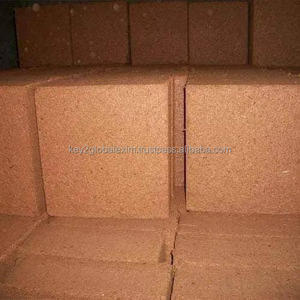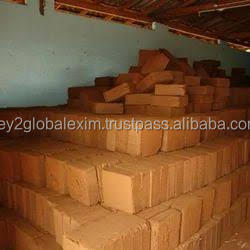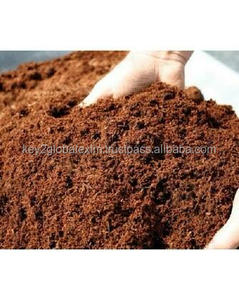(2957 products available)































































































































































































Easy coco is a growing medium made from coconut husks. It is used in hydroponics and soil-based gardening. Coconut husks are a byproduct of the coconut industry. They are processed into a fibrous material that retains moisture well and provides good drainage. This makes easy coco an excellent choice for growing plants without soil. It is environmentally friendly, as it uses a renewable resource. It also offers advantages like better aeration and reduced water needs compared to traditional soil. This is why easy coco is becoming more popular among gardeners and farmers.
Easy coco bricks are compressed blocks of coconut coir, a natural fiber extracted from the husk of coconuts. Coir bricks are designed to expand and provide a lightweight, soil-like medium for growing plants. They are made from the fibrous material between the hard shell and the outer coconut husk. This fiber is durable and biodegradable, making it great for gardening. Easy coco bricks are dried and compacted. When water is added, they swell up, loosening the fiber and becoming a growing medium. Easy coco bricks suit indoor and outdoor gardening and hydroponic systems. They are sustainable, as coir is a renewable resource. Using easy coco bricks can improve plant growth and are better for the environment than soil.
Various types of easy coco bricks are available, each designed to cater to specific gardening needs. Here are some common types:
Standard bricks
These are the most common easy coco bricks. They are made of coconut coir and provide a neutral pH medium for plants to grow in. Standard bricks are suitable for many plants, making them great for gardeners.
Enriched bricks
Enriched bricks contain added nutrients like nitrogen, phosphorus, and potassium. These bricks feed plants right away, making them good for people who want to simplify their gardening.
Compressed bricks
Compressed bricks are tightly packed to save space. They expand a lot when wet, making them good for shipping and storage. Compressed bricks work well in places with limited storage space.
Loose bricks
Loose bricks are less tightly packed than compressed ones. They do not expand as much when wet. They are ready to use without soaking in water first. Loose bricks are good for quick gardening projects.
Custom-sized bricks
Some suppliers offer easy coco bricks in custom sizes and shapes to fit specific gardening needs. These bricks can be shaped to work well in different systems.
Material:
Easy cocos are made of compressed coconut husk fiber. This fiber, also known as coir, comes from the outer husk of coconuts. The material is natural, eco-friendly, and has good water retention properties.
Shape and Size:
Easy cocos come in different shapes to fit various gardening needs. The disc shape fits well in pots, while the block shape can be expanded for larger areas. The sizes range from small discs of 12 inches in diameter to blocks that cover a square foot.
Texture:
The texture of easy cocos is rough but fibrous. This fibrous texture allows for good air circulation to plant roots, promoting healthy growth.
Compression and Expansion:
Easy cocos are compressed tightly to fit shipping containers. When water is added, they expand to their full size, ready for planting. This process makes them convenient for gardeners who need to save space during transport.
Packaging:
Packaging keeps the compressed blocks or discs clean and protected. Suppliers often offer them wrapped in plastic or in boxes. Good packaging is important for maintaining quality until they reach the customer.
Eco-Friendly Aspects:
The design of easy cocos includes being eco-friendly. Using coconut husk fiber helps reduce waste from the coconut industry. It also provides an alternative to peat moss, which is being depleted. This design makes easy cocos a sustainable choice for gardeners.
Indoor Planting
Indoor farming using easy coco bricks is gaining popularity. People are increasingly growing vegetables and herbs indoors. Indoor farming with easy coco bricks works well. The bricks provide a steady water supply. Plants like tomatoes, basil, and lettuce grow well in indoor farms. It is a clean and efficient way to grow food.
Urban Gardening
Urban areas have less space for gardens. But urban gardening is on the rise. People use balconies, rooftops, and community spaces to garden. Easy coco bricks are suitable for urban gardens. They hold water well, which is important in cities where water is scarce. Easy coco bricks enable urban dwellers to have their gardens. They grow plants in a small area.
Greenhouses
Greenhouses let people grow plants year-round. Easy coco bricks work well in greenhouses. They provide a stable environment for plants. Greenhouse plants get consistent water and aeration from coco bricks. This lets vegetables, fruits, and flowers thrive no matter the outside weather.
Hydroponics and Aquaponics
Hydroponics and aquaponics are soil-less growing methods. Hydroponics uses water directly to grow plants. Aquaponics combines fish farming with plant farming. Both methods can use easy coco bricks as a growing medium. Hydroponics systems supply nutrients directly to plant roots. Aquaponics systems use fish waste to fertilize plants. Coco bricks provide an ideal environment for both methods. Plants get aeration and water exchange needed for fast growth.
Research and Education
Coconut coir is a sustainable material. Schools and research centers study its environmental benefits. Easy coco bricks are used in labs and classrooms. Students learn about eco-friendly farming using coco coir. Researchers explore ways to improve plant growth with coco coir. This knowledge can help farmers maximize yields while protecting nature.
Material Quality
When selecting an easy coco, it's essential to prioritize the quality of the materials used. Opt for easy cocos made from durable and long-lasting materials such as high-quality plastic or sturdy fabric. These materials are more likely to withstand regular use and provide longevity for the easy coco. Additionally, consider easy cocos that incorporate eco-friendly materials. With increasing awareness of environmental sustainability, many manufacturers now offer easy cocos made from recycled materials or materials that have a reduced impact on the environment.
Drainage System
A crucial aspect of easy plant care is proper drainage, which helps prevent overwatering and root rot. Look for easy cocos with well-designed drainage systems, including drainage holes or built-in drainage trays. This feature ensures excess water is effectively drained, maintaining a healthy moisture balance for the plants. Moreover, easy cocos with drainage systems reduce the risk of waterlogging, creating a favorable environment for plant growth. Some models even incorporate self-watering systems, allowing plants to access water as needed.
Size and Capacity
The size and capacity of the easy coco should be considered according to the types and number of plants. If one intends to grow larger plants or accommodate multiple plants simultaneously, opting for an easy coco with a more spacious capacity would be wise. Conversely, if the available space is limited or smaller plants are preferred, a compact-sized easy coco would suffice. Additionally, some easy cocos offer expandable or adjustable designs, allowing users to flexibly adapt the size based on their changing needs.
Ease of Use
As the name suggests, an easy coco should be user-friendly. Look for features like easy assembly, simple maintenance, and straightforward watering systems. Removable liners or accessible top openings can make planting and plant care a breeze. Also, consider whether the easy coco is easy to clean. Regular cleaning helps maintain the health and appearance of the plants, and easy-to-clean easy cocos can better meet this demand.
Aesthetic Appeal
The aesthetic appeal of the easy coco should also be considered. Choose a style and color that complements the home or garden decor. Whether a minimalist design or a vibrant color, an aesthetically pleasing easy coco can enhance the visual effect of the living space and showcase the beauty of the plants. Additionally, some easy cocos offer customizable options, allowing users to add personal touches to suit their preferences.
Brand Reputation and Reviews
When selecting an easy coco, it is advisable to consider the brand reputation and user reviews. Opt for well-known brands that have gained trust in the industry. These brands often prioritize product quality and after-sales service, providing users with a better experience. Before making a purchase, it is also helpful to read other users' reviews and feedback. Understanding their experiences can help provide valuable insights into the product's advantages and disadvantages, aiding in making a more informed decision.
Q1. What are the benefits of using Easy Coco Coir products?
A1. Easy Coco Coir products offer excellent water retention, good drainage, and an environmentally friendly alternative to peat moss.
Q2. How does the water retention of Easy Coco coir compare to peat moss?
A2. Coir holds water better than peat moss, making it a great choice for gardening and hydroponics.
Q3. Is Easy Coco Coir an eco-friendly option?
A3. Yes, coir is made from coconut husks, a renewable and biodegradable resource, an eco-friendly choice for gardening and horticulture.
Q4. Can Easy Coco Coir be used in all types of soil?
A4. Yes, coir can be used in any soil, improving drainage and aeration for better plant growth.
Q5. How long does Easy Coco Coir last in the soil?
A5. Coir can last up to five years, much longer than organic materials like peat moss, providing a stable soil amendment.
The keyword "easy coco" exhibits a significant fluctuation in web search volume trends, with an average monthly web search volume of 140. Over the past year, there has been a dramatic increase of 680%, while the three-month change shows a decrease of 19%. This data reveals a highly dynamic interest pattern among users.
Analyzing the monthly data from December 2023 to November 2024, we observe stable web search volumes of around 50 to 70 web searches until September 2024, when there is a sudden spike to 480 web searches. The following months see a decrease, settling back to 390 web searches by November 2024. This pattern suggests a seasonal peak in September, which could be influenced by specific events or market releases related to the "easy coco" product in the Home & Garden category.
The sharp increase in September followed by a gradual decline could indicate a successful marketing campaign or product launch during that period. However, without external context, the exact cause of these fluctuations remains speculative. The overall trend points to growing but volatile interest in "easy coco," which marketers might need to address with targeted strategies to stabilize or further enhance user engagement.